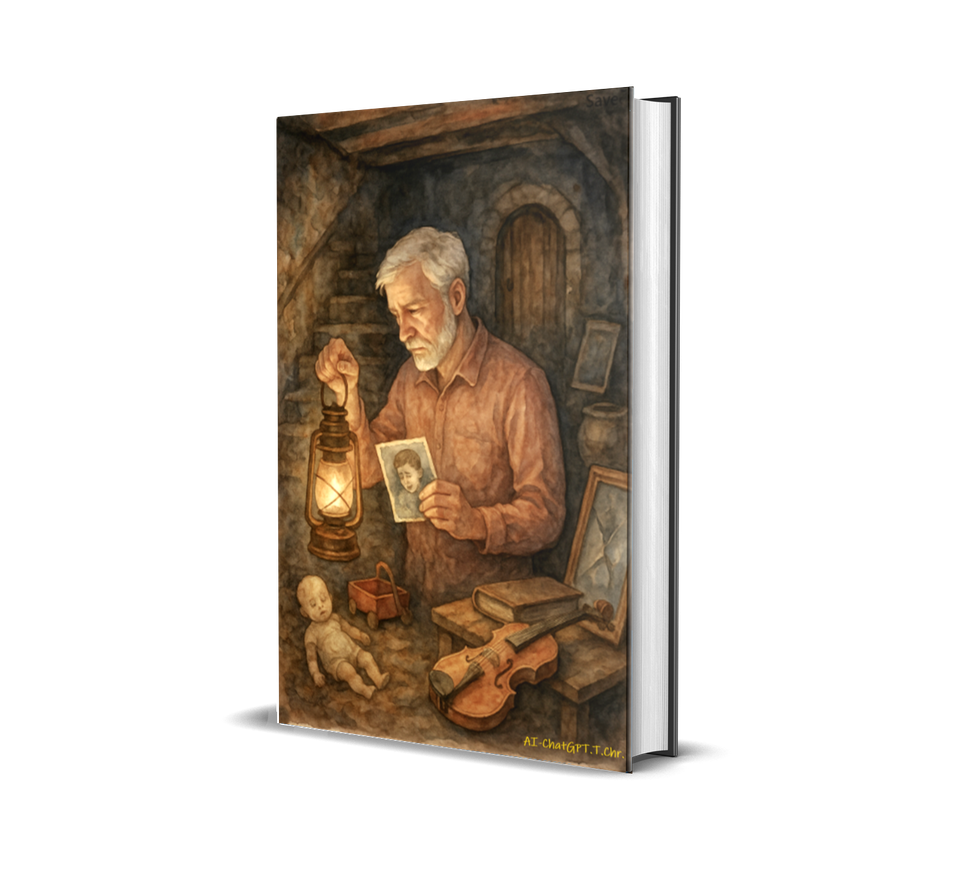"The Lantern in the Cellar awakening the unconscious past"

By AI-ChatGPT-T.Chr.-Human Synthesis-03 August 2025
In the mountain-fringed village of Lirenfell, where seasons passed like gentle songs, there lived a man named Elias. He was known to all: kind but reserved, steady but somehow distant, like a man watching his life from a window he could not open.
His house, inherited from his father and grandfather before him, was sturdy and warm. But beneath it was a cellar sealed for decades—no one spoke of it, not even Elias. As a boy, he once asked his father what was down there. The reply came cold and flat: "Nothing worth remembering." From that day, Elias learned to ignore the pull of the cellar door.
But the shadows still whispered in his dreams.
Sometimes, in quiet moments, he would feel an ache he couldn’t explain. He would hesitate before speaking truths, avoid certain questions, and wake from sleep with the taste of sorrow and forgotten anger. Still, he went on—work, meals, polite conversations. He told himself: This is just life. This is fate.
Then one autumn night, a traveler arrived in the village—an old woman with silver hair woven like vines. She seemed to know people before they spoke. She said little but left a presence behind her, like wind shifting the leaves of trees long thought silent.
When she passed Elias by the well, she looked at him deeply and said, “You live with ghosts you’ve never named. The cellar calls. Go there with a light, or its darkness will keep writing your story.”
Before he could respond, she walked on and disappeared beyond the trees.
That night, Elias could not sleep. The cellar door seemed to hum in the silence of his house. At midnight, he took the old lantern from the attic, lit the flame, and approached the door.
With a creak and a breath of cold air, it opened.
He descended slowly, one wooden step at a time, each groan of the staircase like a voice saying: You’re not who you think you are. The lantern flickered against cobwebbed walls and forgotten corners.
Down there, he found fragments—old toys from his childhood, a diary belonging to his mother, a broken violin, a torn photograph of a boy crying beside a silent man.
He remembered now.
The punishments. The silences. The day he was told boys don’t cry. The fear of being wrong. The longing to be held. The confusion of being told to be strong while feeling shattered inside.
These were not objects. These were truths, hidden and buried.
Elias sat for hours in the cellar, weeping without shame. He let the past rise and speak. He felt anger, grief, longing, even laughter. The walls no longer threatened—they echoed.
And something shifted.
In the days that followed, Elias lived differently. He paused before reacting. He noticed when fear whispered old instructions in his ear. He questioned whether the voice inside him was his own, or an inherited belief.
He spoke to others more openly, shared pieces of his story. Some were shocked; others leaned in, eager to speak of their own cellars. He began to help others descend into their own darkness, not as a rescuer, but as a companion with a lantern.
The villagers saw the change in Elias. He no longer seemed haunted. He was grounded, fully present, like a man who had gone to the edge of himself and returned.
They asked him his secret.
He simply said, “Fate is just a name we give to the stories we haven’t examined. When we shine a light into our shadows, we become the authors again.”
Reflection:
This story reminds us that:
- The unconscious—our past wounds, forgotten memories, and internalized beliefs—will shape our decisions until we bring them to light.
- Awareness is not always comfortable, but it is always the first step to freedom.
- Healing is not about forgetting, but about facing and transforming.
- We all have a cellar. And within it, not monsters—but lost parts of ourselves waiting to come home.
